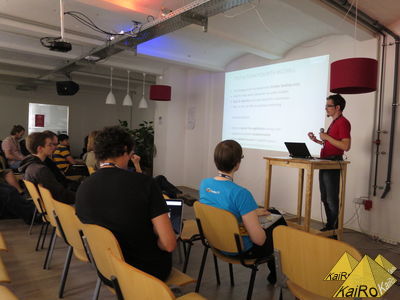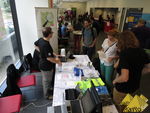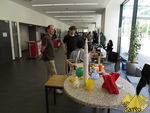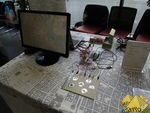The roads I take...
KaiRo's weBlog
| Zeige Beiträge veröffentlicht im Mai 2014 und auf Englisch an. Zurück zu allen aktuellen Beiträgen | |||||||||||||||||||||||||||||||||||||||||||
12. Mai 2014
Hacking Day And Linuxwochen
In the last weeks, I spent some time on developer events, which I always embrace a lot because the "hallway tracks" are a constant great flow of interesting information and discussions - and of course the official talks are often quite interesting as well! 

First up was the Mozilla Hacking Day in Berlin on Saturday, April 26. I met Arpad Borsos, fellow Mozillian from Vienna, already at Vienna airport on Friday, as we incidentally were hopping over from the Austrian to the German capital in the same plane. Later in Berlin, we met more Mozillians at the hotel and went out for dinner together.
At the actual Hacking Day, we had ~70 people streaming in for some introductory talks, and then people split up into hacking sessions and some more in-depth talks (like the one in the picture, where fellow "Desktop QA" team member Henrik talked about automated testing), which were followed by even more hands-on hacking. I spent most of the time talking to various people about different topics, showing off Firefox OS a bit (after I had reflashed my Geeksphone Peak and got it into a working stage again during the talks) and my actual "hacking" achievement: Together with Georg Fritzsche, we could find out that an issue with my Lantea Maps app freezing was a WebGL-related bug in Gecko, found a stack, reported it as a new bug and set a needinfo flag to a gfx developer. (Yesterday, I found a hacky workaround so Lantea Maps will soon work again despite that bug.)
On Sunday, I also was able to squeeze in some sightseeing and photo-taking, marching through Berlin for ~3.5h before returning to the airport.



And last week, May 8-10, it was time for the yearly Linuxwochen conference in Vienna. As we do not have an organized group of Mozillians here, we didn't have a Mozilla booth, but I usually share the OpenStreetMap booth (that's why you'll spot that in the pictures), as I'm pretty active in the local community there, and just run around with Mozilla T-shirts and talk about Mozilla stuff in addition to OSM things. I also had submitted talks about Firefox OS and the Makey Makey, but as you'll see in my speaker profile, I was additionally "coerced" into a privacy and security panel discussion last-minute as well. I was put there as more or less a representative of Mozilla and more in general those doing end-user software, and of course also tried to drum home a few points of how Mozilla strongly works for respecting user privacy but also pointed out how it is an interesting field that sometimes has tradeoffs with enabling features that people out there really want, and finding a balance can be hard.
The Firefox OS talk was quite appreciated by people attending, and we had quite a few good questions asked there as well, and interest from people afterwards to actually see and try my FxOS phones - I remember how some hard a hard time believing how well the ZTE Open worked with just 256MB of RAM and an all-web UI.
In the "hallway track", I did get a lot of questions about Mozilla on all three days, given my T-shirts clearly pointed out my affiliation with the project. Some of those were Firefox OS, mostly about strategy and availability, where I had to explain a few times how we target features phone converts in emerging markets for now. A number of the concerns and questions were around Australis, with quite a few of the very technical folks there not liking how we messed up their customizations and preferences, including tops-on-bottom or the add-ons bar, or how esp. our tabs looked "just like Chrome" now, but I even heard one or two comments on how awesome the new design was. Some of those I could ease with explanation and pointing to the Classic Theme Restorer add-on, but some of them are just unhappy (and it's not helpful that the very helpful Tour does not run when NoScript is installed and active). And then there were questions about our finances (the "Google dependency" issue) and about the fact that new Sync clashes with Master Password (which also protects casual "friends" from reading through passwords in your password manager), among others. Overall, a lot of talk about Mozilla, and I hope I could make most of those people feel better about us than before, wherever they stood then.
Both events cost me a lot of sleep and energy right there, but feel like they were worth the investment for sure, and the meeting and talking to people also gives me energy of a different form.
First up was the Mozilla Hacking Day in Berlin on Saturday, April 26. I met Arpad Borsos, fellow Mozillian from Vienna, already at Vienna airport on Friday, as we incidentally were hopping over from the Austrian to the German capital in the same plane. Later in Berlin, we met more Mozillians at the hotel and went out for dinner together.
At the actual Hacking Day, we had ~70 people streaming in for some introductory talks, and then people split up into hacking sessions and some more in-depth talks (like the one in the picture, where fellow "Desktop QA" team member Henrik talked about automated testing), which were followed by even more hands-on hacking. I spent most of the time talking to various people about different topics, showing off Firefox OS a bit (after I had reflashed my Geeksphone Peak and got it into a working stage again during the talks) and my actual "hacking" achievement: Together with Georg Fritzsche, we could find out that an issue with my Lantea Maps app freezing was a WebGL-related bug in Gecko, found a stack, reported it as a new bug and set a needinfo flag to a gfx developer. (Yesterday, I found a hacky workaround so Lantea Maps will soon work again despite that bug.)
On Sunday, I also was able to squeeze in some sightseeing and photo-taking, marching through Berlin for ~3.5h before returning to the airport.
And last week, May 8-10, it was time for the yearly Linuxwochen conference in Vienna. As we do not have an organized group of Mozillians here, we didn't have a Mozilla booth, but I usually share the OpenStreetMap booth (that's why you'll spot that in the pictures), as I'm pretty active in the local community there, and just run around with Mozilla T-shirts and talk about Mozilla stuff in addition to OSM things. I also had submitted talks about Firefox OS and the Makey Makey, but as you'll see in my speaker profile, I was additionally "coerced" into a privacy and security panel discussion last-minute as well. I was put there as more or less a representative of Mozilla and more in general those doing end-user software, and of course also tried to drum home a few points of how Mozilla strongly works for respecting user privacy but also pointed out how it is an interesting field that sometimes has tradeoffs with enabling features that people out there really want, and finding a balance can be hard.
The Firefox OS talk was quite appreciated by people attending, and we had quite a few good questions asked there as well, and interest from people afterwards to actually see and try my FxOS phones - I remember how some hard a hard time believing how well the ZTE Open worked with just 256MB of RAM and an all-web UI.
In the "hallway track", I did get a lot of questions about Mozilla on all three days, given my T-shirts clearly pointed out my affiliation with the project. Some of those were Firefox OS, mostly about strategy and availability, where I had to explain a few times how we target features phone converts in emerging markets for now. A number of the concerns and questions were around Australis, with quite a few of the very technical folks there not liking how we messed up their customizations and preferences, including tops-on-bottom or the add-ons bar, or how esp. our tabs looked "just like Chrome" now, but I even heard one or two comments on how awesome the new design was. Some of those I could ease with explanation and pointing to the Classic Theme Restorer add-on, but some of them are just unhappy (and it's not helpful that the very helpful Tour does not run when NoScript is installed and active). And then there were questions about our finances (the "Google dependency" issue) and about the fact that new Sync clashes with Master Password (which also protects casual "friends" from reading through passwords in your password manager), among others. Overall, a lot of talk about Mozilla, and I hope I could make most of those people feel better about us than before, wherever they stood then.
Both events cost me a lot of sleep and energy right there, but feel like they were worth the investment for sure, and the meeting and talking to people also gives me energy of a different form.
Von KaiRo, um 18:42 | Tags: Lantea, Linuxwochen, MaKey MaKey, Mozilla, OSM | keine Kommentare | TrackBack: 0
1. Mai 2014
Finding an Openly Licensed JS Graph Library
As I mentioned at the end of the recent post on stability graphs, I was looking for doing JS-based, dynamic versions of those graphs. Those would be able to always have current data without manually copying stuff around (as I've done previously) and should be available to more people in the Mozilla community.
That said, even though I tried previously to do some canvas magic to create graphs in JS, it's tedious to create all that code by oneself, so I set out to find a library that can help me.
My set of ideal requirements was:
So, I went on a web search and tried to find libraries that would fulfill my requirements. Interestingly, I saw a number of commercially licensed JS libraries floating around, I guess there's some business in creating graphs out there.
The list below is the libraries I took a closer look at (before you ask, flot is not on the list because it requires jQuery and therefore violates my "graphs only" and "lightweight" goals right away):Chart.js This one is lightweight and graph-only. Examples do not have dynamic tooltips but a number of animations that are only distracting from the actual graph data. RGraph Dynamic tooltips in the examples are a bit sluggish. Supports feeding JSON to it directly. dygraphs Has interactive zoom etc. by default, supports annotations for specific points. Has somewhat of a list of dependencies (all open). Only supports CSV or JS Array data.
So none of those turned out to be completely ideal in the light of my goals/preferences. That said, dygraphs looked decent enough so I went with that in the end and have dynamic versions of my graphs implemented.
(Ping me on IRC if you want a link, I don't want to link them on the blog as the uninformed could come to wrong or hasty conclusions looking at the data).
Of course, if you are looking for a graphs library for your project, you might chose completely differently, but maybe the list is helpful to find what fits your needs.
That said, even though I tried previously to do some canvas magic to create graphs in JS, it's tedious to create all that code by oneself, so I set out to find a library that can help me.
My set of ideal requirements was:
- It should do graphs only, my code can handle the rest.
- It should be lightweight and easy to integrate.
- It must be Free Software (i.e. have an "open source" license that allows all freedoms we are used to for code at Mozilla).
- It should support mousing over the graph series and getting exact values.
- Possibly, have annotations for certain points in the graph ("this spike was the Google doodle crash" or "this day, was had data anomalies").
- Potentially allow zooming into a certain time frame as I have long time series in those graphs.
- Maybe it would be nice if it could read my JSON data directly, but I need some processing of the numbers anyhow, so JS objects/arrays or such as data input is OK as well.
So, I went on a web search and tried to find libraries that would fulfill my requirements. Interestingly, I saw a number of commercially licensed JS libraries floating around, I guess there's some business in creating graphs out there.
The list below is the libraries I took a closer look at (before you ask, flot is not on the list because it requires jQuery and therefore violates my "graphs only" and "lightweight" goals right away):
- D3.js
- Can do lots of things, including tons of animations.
- Centers around reorganizing DOM access, i.e. does way more than what I like and violates "graphs only" and "lightweight" goals just as much as jQuery/flot.
So none of those turned out to be completely ideal in the light of my goals/preferences. That said, dygraphs looked decent enough so I went with that in the end and have dynamic versions of my graphs implemented.
(Ping me on IRC if you want a link, I don't want to link them on the blog as the uninformed could come to wrong or hasty conclusions looking at the data).
Of course, if you are looking for a graphs library for your project, you might chose completely differently, but maybe the list is helpful to find what fits your needs.
Von KaiRo, um 01:12 | 6 Kommentare | TrackBack: 0
